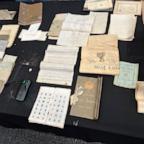The untold 'Oppenheimer' story: The female activists fighting for justice after the Trinity Test
Hispanic and Native Americans near the nuclear lab still deal with the fallout.
Bernice Gutierrez says she was eight days old when the world's first atomic bomb was detonated 35 miles east of her home in 1945.
The bomb was detonated from the Trinity Test site, a location developed by Los Alamos National Laboratory, the setting of the now-famous Manhattan Project. It was chosen due to its relative isolation and in the middle of a massive swath of land being used as a bombing range. However, census data shows that around half a million people lived within a 150-mile radius of the test.
Gutierrez said her family alone is five generations deep with cancer diagnoses, including 31 cases of radiogenic diseases on her mother's side. Twenty-two members of her family had cancer, and seven died from cancer, she said.
Gutierrez's story is one of many Hispanic and Native Americans, known as "Trinity Downwinders," whose lives were impacted by the development and testing of the bomb at the Trinity Test site, an event which she, and many other members of the New Mexico community, say has ravaged the population with cancer and other ailments for generations.

"I call it our past, our present, and our future," she said in an interview with "Good Morning America," pointing out that the 24,000-year half-life of plutonium is the equivalent of 7,000 generations.
"We're never going to get over this. Never," she said.
Cancer is the second leading cause of death in the United States, according to the Mayo Clinic. Although radiation exposure is a known risk, it may be impossible to know how much radiation exposure in this community may or may not have influenced a person's chances of getting cancer.
Filmmaker Christopher Nolan's universally lauded and award-nominated triumph, "Oppenheimer," released last year, tells the story of physicist J. Robert Oppenheimer working to build and test the world's first atomic bomb at Los Alamos. Through "Oppenheimer," renewed attention has shifted to a consequential chapter of American history generally shrouded in secrecy.
"They ruined our land, our water, our people. The generations of cancer that we go through is a stress," said Gutierrez.
Tina Cordova is the founder of the Trinity Downwinders Consortium, an organization seeking justice for the victims of testing in the area.
Cordova, who is Hispanic and whose family lived in the vicinity of the Trinity Test site, is hoping the renewed attention around the "Oppenheimer" film will shine a light on the cancer risk.
"We were the first people exposed to radiation any place in the world as a result of an atomic bomb," said Cordova.

Cordova, who said she and her 23-year-old niece are both battling cancer diagnoses, said there are multiple families in Tularosa, New Mexico, in which every single family member has cancer.
"We are the people that lived 12 miles away from the test site and have been dying ever since," said Cordova.
The "Downwinders" are in a battle against time, too. They have until June for Congress to pass a new extension to the Radiation Exposure Compensation Act Expansion that includes the "Downwinders" as a group eligible for compensation for medical treatments so many of them need.
On Thursday, the Senate passed the bill by a vote of 69-30, sending the vote to the House of Representatives. In a statement of administration policy prior to the Senate vote, the Biden administration indicated support for the passage of the bill.
"On June the 7th, if Congress doesn't act, thousands of Americans who have depended on this program for lifesaving support are going to get nothing," Sen. Josh Hawley, R-MO, told ABC News.
'They did the dirty work'
The consequences of the radiation reach beyond just the test site as the exposure to the radiation by workers at the Los Alamos National Laboratory has been an issue for decades.
Loyda Martinez, a former employee of the Los Alamos National Laboratory, made several trips to Washington D.C. through the years to advocate for the release of medical records relating to her dad's illness and eventual death in 1991. Her father was also an employee of the lab.
"The local Hispanics like my dad, they did the dirty work, literally the dirty work, they handled the hazardous materials… under secrecy," said Martinez.
After years of prodding, and with help from Congressman Tom Udall, the lab finally released her father's medical records, revealing he did not die of chronic obstructive pulmonary disease, caused by smoking as a teenager– a cause which his laboratory-employed doctor had identified– but rather, medical records showed he died of Berylliosis, a disease caused by the exposure of beryllium, something she said occurred due to his work at the Los Alamos National Laboratory without proper protection.

"Everyone knows about the destruction and death that this bomb inflicted in Hiroshima and Nagasaki," said Martinez. "But they have no mention of the Hispanic community and how we were their sacrificial lambs."
Martinez said aside from the risk posed to their health, the government took property, too.

In the 1940s, the government seized land owned by Hispanic and Native families in the area to make way for the laboratory.
"They were given 48 hours to leave, but the government told them that they get their homes and their lands back after the war was over…That never happened," she said.
As for the land used by Los Alamos, the laboratory claims compensation has been rewarded to those able to prove eviction.
"Hispanic homesteaders were compensated for their land by the Army at a significantly lower rate than white homesteaders. In 2004, Congress passed the creation of a $10 million Pajarito Plateau Homesteaders Compensation Fund to be divided among claimants who were able to prove their relation to the evicted homesteaders," said a spokesperson from Los Alamos National Laboratory in a statement to ABC News.
Bernice Gutierrez, who has been working alongside Tina Cordova for years with the "Downwinders," believes it is no coincidence that New Mexicans have not been compensated by the Radiation Exposure Compensation Act. Other "Downwinders," like those from the Nevada test site, have been given financial compensation from the government under RECA, but the "Trinity Downwinders" are still fighting to be included.
"There's an obvious difference. The New Mexicans were primarily Hispanic and Native American…I believe it's racial environmental discrimination," she said.
'We're finally being recognized'
With renewed attention around the bomb and the project, the activists had mixed feelings about the "Oppenheimer" film.
"We're the forgotten collateral damage of the Manhattan Project and Oppenheimer's bomb," said Cordova, who expressed disappointment that the film did not tell their story. Martinez said she did not see the film because it did not tell stories like that of her father, whom she called a hero.
ABC News reached out to the "Oppenheimer" filmmakers and they did not immediately respond.
Gutierrez expressed a similar disappointment but acknowledged the movie has sparked new conversations about the bomb detonation in New Mexico.
She said a new documentary, "First We Bombed New Mexico," tells their community's previously untold story in full, and noted the success has been "gratifying."
While the health risks afflicting the community may remain, acknowledgment is starting to come their way.
"I truly believe that people's eyes are opening to this history that was hidden for… well, forever," said Gutierrez. "We're finally getting acknowledged, and we're finally being recognized as victims."




